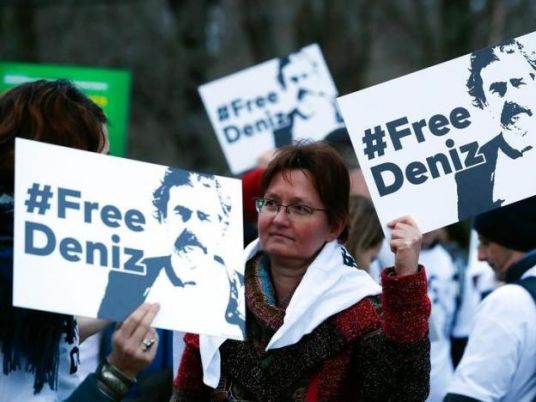
Berlin summoned Ankara's ambassador on Tuesday to protest the arrest in Turkey of a correspondent for a German newspaper, further fuelling tensions between the two NATO allies as demonstrations took place across German-speaking Europe.
Deniz Yucel, a German-Turkish dual national with Die Welt, faces up to 10 and a half years in prison after being arrested on charges of propaganda in support of a terrorist organization and inciting public violence, his lawyer Veysel Ok told Reuters on Tuesday.
"German-Turkey relations are facing one of their greatest challenges of the modern era," Foreign Minister Sigmar Gabriel told reporters in Berlin.
Gabriel said freedom of speech was protected by the constitutions of both countries, and none that claimed to be democratic or to respect human rights could "misuse" its judicial system to go after journalists.
Yucel, the first German journalist held in a widespread crackdown in Turkey following a failed coup in July, was first detained on Feb. 14 and on Monday an Istanbul court ordered him jailed pending trial.
Chancellor Angela Merkel on Monday called the decision "disappointing" and "disproportionate," and said Berlin would insist on "fair and legal treatment" for Yucel.
German-Turkish ties have been strained over post-coup arrests and sackings of tens of thousands of people, and by a federal probe into possible spying by Turkish clerics in Germany.
At the same time, Berlin is counting on Turkey to uphold a deal with the European Union to prevent refugees from crossing to Greece.
Axel Springer media group, which owns Die Welt, mounted a huge sign proclaiming "#freedeniz" on the roof of its building in central Berlin, while protests against his arrest took place in 10 German cities as well as in Switzerland and Austria.
'INCREASINGLY DIFFICULT'
German Justice Minister Heiko Maas on Tuesday said Ankara's prospects of joining the EU would become "increasingly difficult to impossible" unless it stuck to basic European values.
He also set a high bar for a possible visit by Turkish President Tayyip Erdogan.
"With respect to visits by Turkish politicians in Germany, it is clear that those who want to benefit from freedom of speech here should also safeguard the rule of law and freedom of the press at home," Maas said in a statement.
During their investigation, prosecutors questioned Yucel's ties to a leftist hacker group alleged to have obtained emails from the private account of Berat Albayrak, Turkey’s energy minister and Erdogan’s son-in-law, Yucel's lawyer said.
They also questioned him about a 2015 interview with Cemil Bayik, a senior member of the outlawed Kurdistan Workers Party (PKK), the lawyer said.
Gabriel said the case was making it "extraordinarily difficult" for even well-intentioned Turks and Germans to continue to work for improved relations. He said Berlin was demanding consular access to Yucel, and doing all it could to secure his release.
Yucel said at the Frankfurt Book Fair in October he was lucky to have a German passport because it had allowed him to keep working, said Can Dundar, a Turkish journalist now working in exile in Germany.
"He had faith in his German identity, but it didn't work," Dundar told Reuters.
(Reporting by Andrea Shalal in Berlin and Ece Toksabay in Ankara, with additional reporting by Gulsen Solaker; editing by Andrew Roche and John Stonestreet)



